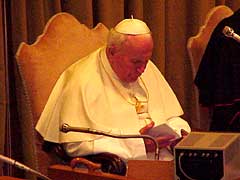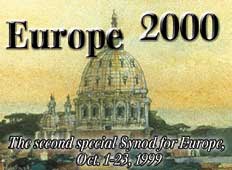European Synod
II
A Latin American option for
the next conclave
By JOHN L. ALLEN JR.
NCR Staff
Rome
Yesterday Tom Fox offered a theory on how the selection of the next
pope might unfold, which led him to suggest four 70-something Italian
candidates. Today I’ll present another line of thought making the
rounds, which points to some Latin Americans as good bets among the
papabile.

Pope John Paul II
photo by -- Tom Fox
Since there are 107 cardinals eligible to be pope, electors need a
quick way to narrow the possibilities. One time-honored way is by
geography - decide first where you want the next pope to come from,
then pick someone from that area. Cardinal Franz König said in a
recent interview with NCR that this is how John Paul II was
elected in 1978 -- after Cardinal Giovanni Benelli’s candidacy
stalled, the electors decided they would look outside Italy, and König
suggested a man from behind the Iron Curtain.
Assuming geography is the first filter the electors apply again this
time, the theory Tom Fox presented implies they will turn to an
Italian for the sake of stability. But others believe the choice of
Wojtyla ended that bias. Indeed, there are many cardinals around the
world probably cold to returning to the “Italian captivity”
of the papacy - if for no other reason than to keep their own hopes
alive.
If not Italy, then where?
It is critical to remember that this will be the first conclave of
the third millennium. That fact alone will impose tremendous
psychological pressure on the electors to be forward looking, choosing
a man who embodies the church of the future. That means the developing
world, where seventy percent of Catholics today live - and the only
place where the church is experiencing significant growth.
This could mean an African such as Nigerian Cardinal Francis Arinze,
but for men accustomed to “thinking in centuries,” the
African church (below the Sahara) probably seems far too new, too
fluid to be ready for the papacy. There aren’t enough Catholics
in Asia for that region to make sense. Thus if the cardinals want a
Third World pope, it seems more likely they will turn to a Latin
American.
On the theory that each conclave elects a pope to balance the
weaknesses of the one before, the electors will also want a man with a
better grasp of the inner workings of the Vatican than Wojtyla had in
1978. There is a wide consensus at the upper levels of the church that
John Paul has relied too much on an inner group of advisors and let
the curia run itself, inflating its power. The electors will be
looking for a pope who can bring his own bureaucracy to heel.
Combined with the fact that many important Latin American sees right
now are either vacant or filled with archbishops, the Latin American
will have to come from the curia. Four men fit the bill: Alfonso López
Trujillo, a Colombian and head of the pontifical council on the
family; fellow Colombian Dario Castrillon Hoyos, head of the
congregation for clergy; Lucas Moreira Neves of Brazil, a Dominican
who heads the congregation for bishops; and Jorge Medina Estévez
of Chile, who runs the congregation on liturgy and the sacraments.
Trujillo is probably the longest shot of the group, for one thing
because of his age (at 63, he would be only five years older than
Wojtyla was in 1978, and few cardinals seem to want another lengthy
papacy). More basically, Trujillo is probably too far to the right. He
was the most bitter foe of liberation theology during his years as
president of the Latin American bishops conference (CELAM). While few
of the electors may be progressives, there is wide agreement that the
church does not need another twenty years of rigid doctrinal
enforcement.
Castrillón, 70, is a more attractive candidate. As head of
the congregation for clergy, he has wide contacts with churchmen
around the world, building a network of support that could help him.
Journalists at the end of the Synod for America in 1997 reported that
Castrillon’s friends were spreading the word on him as a
possibility. He is not without baggage -- Castrillón too was a
player in the anti-liberation theology crusade. In 1986, for example,
he said of Brazilian Fr. Leonardo Boff: “Boff will have to ask
God to forgive him, and when God answers, then the pope and I will
know whether to forgive him or not.” Yet to the extent electors
compare him to fellow Colombian Trujillo, Castrillón ends up
looking moderate.
Neves, 74, has for several years been touted as John Paul’s
personal choice as a successor. It is no accident that the pope made
Neves head of the congregation for bishops, where he has been able to
build up a powerful base of cardinals who owe him favors. A Dominican,
Neves has a reputation as an intellectual. Yet precisely because he is
so close to the current pope, those seeking a change - even one of
style rather than of substance -- may look past him in the next
conclave. Also, his health is poor due to a severe case of diabetes,
and few electors want a repeat of John Paul I’s 30-day reign.
Medina Estévez. 72, a Chilean, has run the congregation for
liturgy and sacraments since February 1998.He too is conservative.
Under his administration, the liturgy office has developed a
reputation for micro-management that will not help him in the next
conclave, assuming that many cardinals will support a program of
decentralization.
Thus for those advancing the Latin American curialist theory, the
possibilities really narrow to one man: Dario Castrillón Hoyos.
For that reason, lots of ears will perk up when he addresses the
synod.
National Catholic Reporter, October 5, 1999
|



